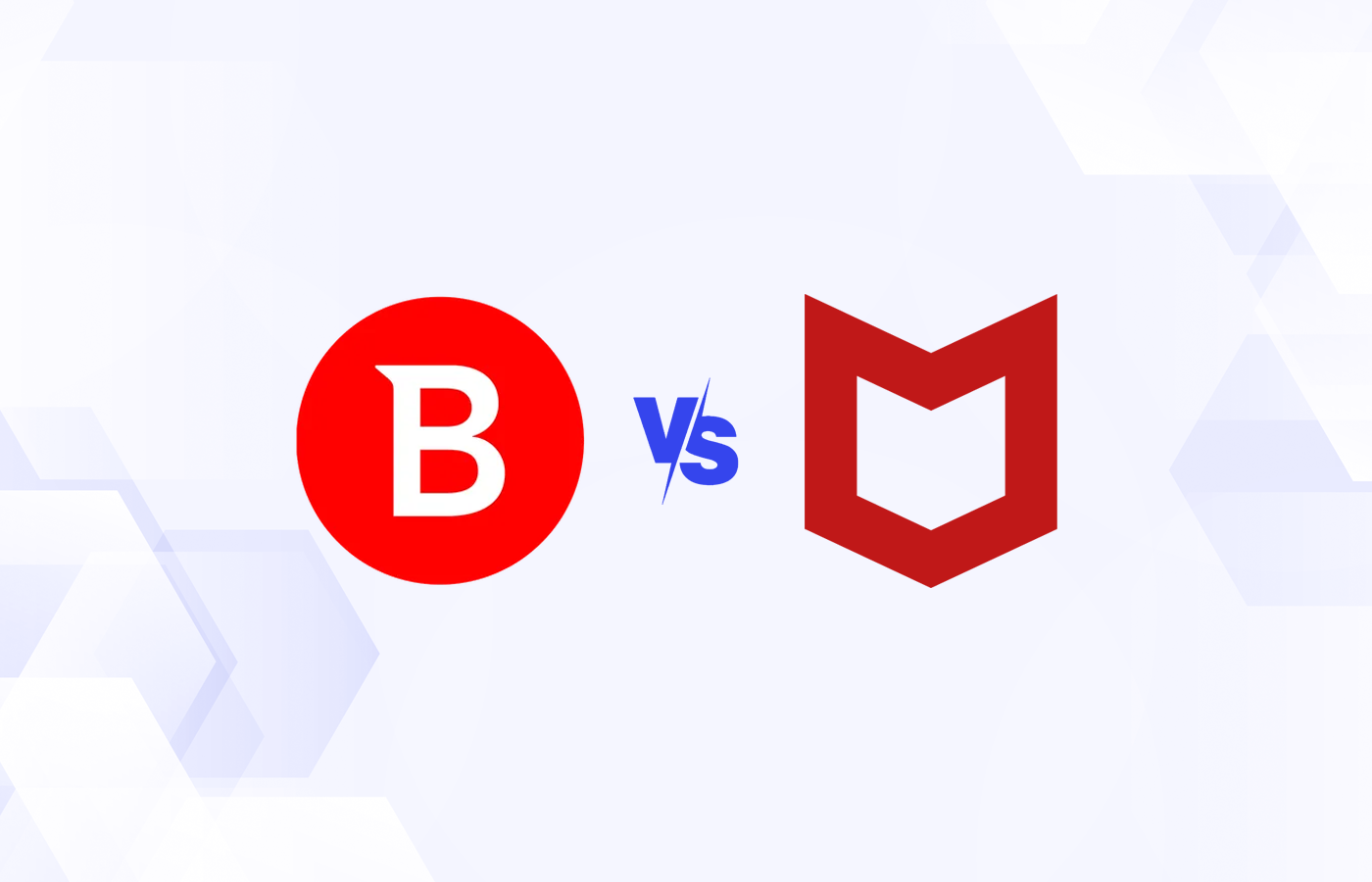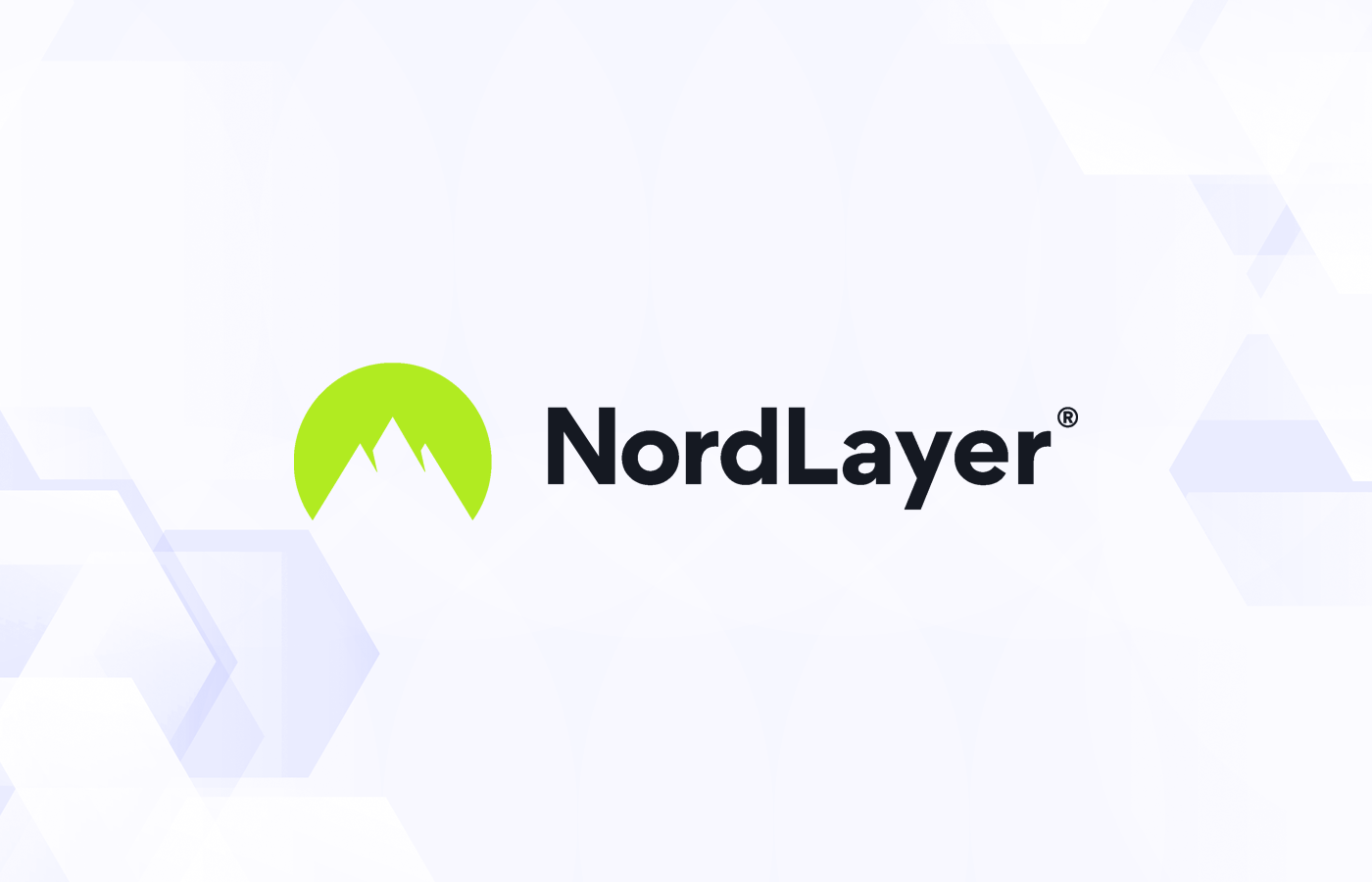Dashlane and LastPass are password managers known for their ease of use and well-rounded features. From there, the paths diverge. Dashlane includes unlimited passkey support, a clean breach history, and developer-level secrets management. LastPass is more accommodating for smaller teams and offers greater flexibility with user permissions. If you’re undecided between them, I’ve compared their features, pricing, and support options to help you find the right fit.
- Dashlane: Better for large businesses with an emphasis on security and secrets management ($8 per user per month for Business license; contact for Enterprise pricing)
- LastPass: Better for small businesses with an emphasis on affordability and usability ($4 per user per month for Teams license; $7 per user per month for Business license)
Table of Contents
Dashlane vs LastPass at a Glance
| Monthly Price (Billed Annually) | • Business: $8/user • Enterprise: Call for quote | • Teams: $4/user • Business: $7/user • Enterprise: Call for quote |
| Free Trial (Business) | 14 days | 14 days |
| Breach History | None | Yes, last one in 2022 |
| Single Sign-On Support | Yes, included with license | Yes, for up to 3 apps Purchase an add-on for unlimited support |
| CLI Secrets Management | Yes | No |
| Local Apps | iOS, Android | iOS, Android, PC, Mac, Linux |
| Visit Dashlane | Visit LastPass |
Dashlane has a clean breach history, offers developer secrets management, and includes unlimited SSO support with its Business license. However, it lacks a smaller-scale teams plan and no longer has a dedicated desktop app. LastPass is more affordable and supports local apps for all major platforms, but it has been breached several times, most recently in 2022. My complete scoring methodology is below, or keep reading for an overview of each product.

Dashlane Overview
Better for Large Businesses with an Emphasis on Security
Overall Rating: 3.7/5
- Core features: 4.1/5
- Security: 4.1/5
- Ease of use & implementation: 3.9/5
- Advanced features: 3.3/5
- Customer support: 3.8/5
- Pricing: 2.5/5
Dashlane is used by thousands of companies around the globe. It stands out for its 24/7 dark web monitoring, phishing alerts, secrets management, and unlimited passkey support. Dashlane uses zero-knowledge architecture and AES 256-bit data encryption. It’s never been breached. Thanks to its clean interface and generally straightforward setup, it’s a good choice for those who are new to password management software.
Pros & Cons
| Pros | Cons |
|---|---|
| Unlimited passwords and passkeys | No lower-cost teams plans |
| Never been breached | Offline access is mobile only |
| Secrets management for developers | Policy management not as customizable |
Key Features
- Single sign-on (SSO): Dashlane Business includes its Confidential SSO. Alternatively, you can use a self-hosted SSO.
- Dark web monitoring: Dashlane monitors the dark web for affected email addresses and associated personal information like credit cards and Social Security numbers.
- Secrets management: Store and share sensitive information within a secure vault, or use the command line interface to manage files, change settings, or automate tasks.
- VPN: Dashlane has an integrated VPN to protect users who browse unsecured WiFi networks and open access to region-locked content.
- Customer support: Dashlane offers email support seven days a week, as well as on-demand phone support and live chat during East Coast business hours.
Our complete Dashlane review has more information on pricing, features, ease of use, and support availability.

LastPass Overview
Better for Smaller Teams with an Emphasis on Usability
Overall Rating: 3.7/5
- Core features: 4.1/5
- Security: 3.1/5
- Ease of use & implementation: 4.5/5
- Advanced features: 2.8/5
- Customer support: 4.1/5
- Pricing: 3.1/5
LastPass is well-known for its ease of use and overall affordability, making it another sound option for smaller companies that aren’t versed in password management software. However, it does offer admins flexibility in setting user permissions and security policies. Despite its breach history, many businesses today still rely on LastPass for its dark web monitoring, SIEM integrations, and secure sharing. It offers 24/7 customer service via phone and web.
Pros & Cons
| Pros | Cons |
|---|---|
| Flexible policy management rules | Has been breached in the past |
| 24/7 phone support | No support for passkeys |
| Offline access across all platforms | Need to pay extra for unlimited SSO |
Key Features
- Policy management rules: LastPass Teams comes with 25 custom access and authentication policies. That increases to over 100 with LastPass Business.
- Dark web monitoring: LastPass searches for hashed versions of email addresses for possible breaches and sends a notification if anything has been detected.
- Advanced reporting: With a LastPass Business license, admins can generate reports on user activity, SSO, SAML events, and more.
- Offline mode: Download the LastPass app, and you’ll be able to access your data without an internet connection. It supports iOS, Android, Windows, Mac, and Linux.
- 24/7 live support: If you’re in a bind, you can reach out to LastPass via phone or email at any time for help from an agent.
Our LastPass review has more information on core features, security, usability, and support options.
Better for Pricing: LastPass
| Teams Monthly Pricing | N/A | $4/user for up to 50 users |
| Business Monthly Pricing | $8/user | $7/user |
| Enterprise Pricing | Contact for quote | Contact for quote |
| Free Version | Yes; stores up to 25 passwords | Yes; stores unlimited passwords |
| Free Trial for Business | 14 days | 14 days |
| Billing Options | Annual | Annual |
| Visit Dashlane | Visit LastPass |
Winner: The availability of an affordable Teams plan gives LastPass the edge over Dashlane, which recently discontinued its budget-friendly small business tier.
Dashlane eliminated its 10-user Teams plan and now only offers a Business tier at $8 per user per month plus an Enterprise tier with custom pricing. While large organizations may be able to afford this, it could price out small teams with limited runway, especially since all plans must be paid for the year up-front. The free version of Dashlane includes storage for 25 passwords, passwordless login, and secure notes with 1GB of encrypted storage for one device/user.
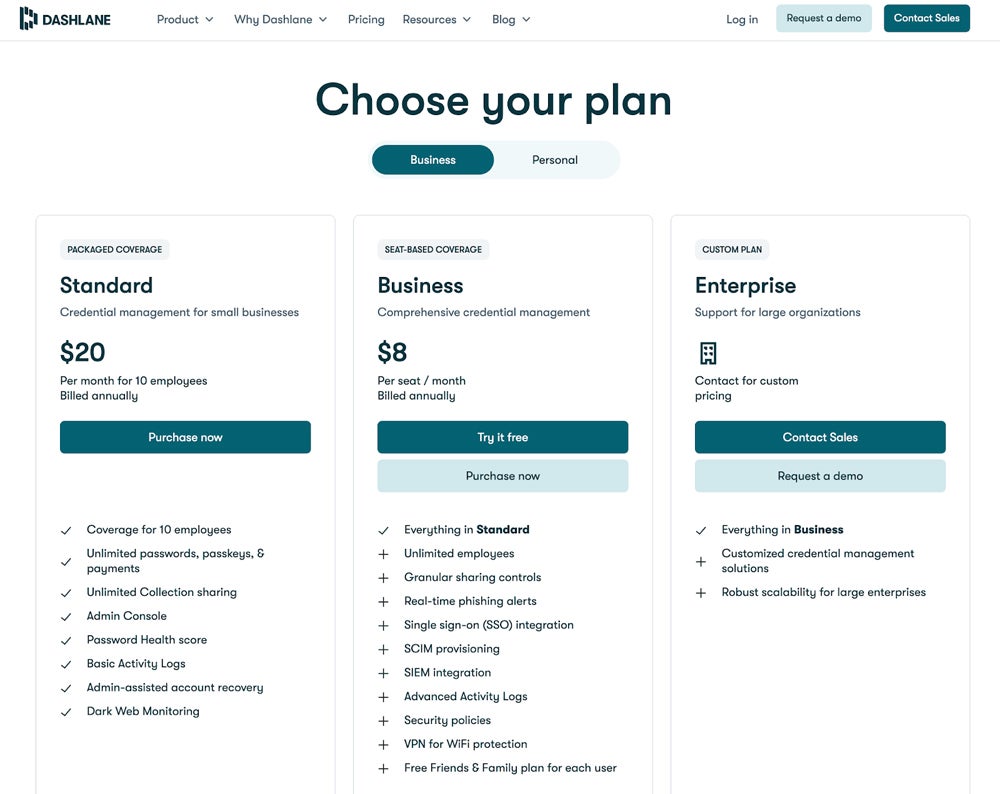
LastPass also exclusively bills by the year, but it has a Teams plan that costs $4 per user per month for up to 50 users. LastPass Business ($7 per user per month) supports unlimited seats, with optional add-ons for SSO and MFA support at up to $10 per user per month. An enterprise plan is available via quote. LastPass Free is limited to one user and device type and only includes 50MB of storage, but it can store as many passwords as you need.
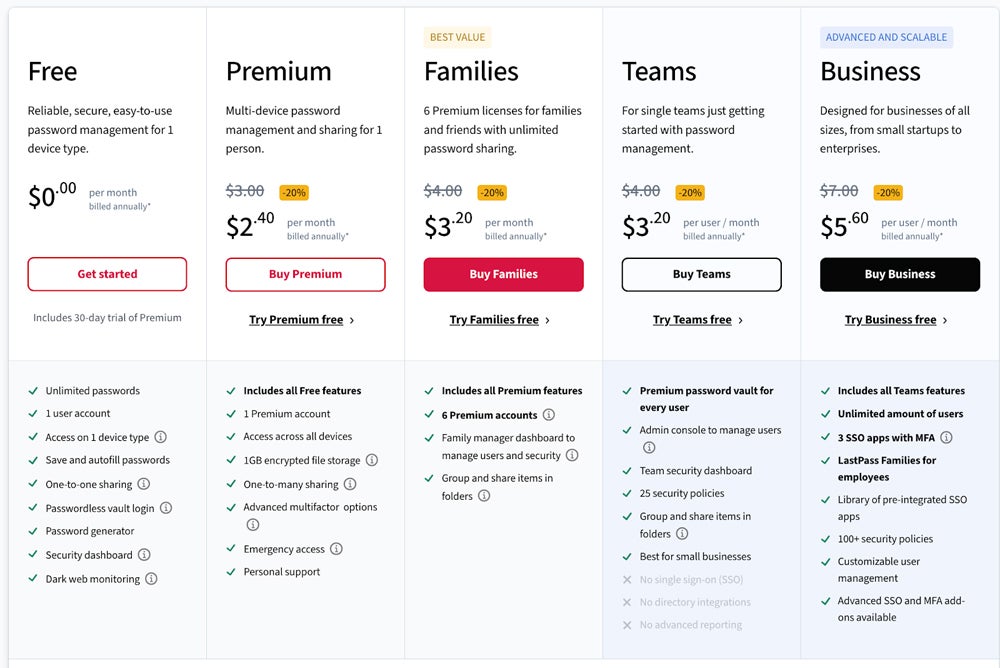
Better for Core Features: Tie
| Single Sign-On | Included in Business license | Limited with Business; full support requires add-on fees |
| Developer Secrets Management | Yes | No |
| Group Sharing | Yes | Yes (Business only) |
| Data Migration | Import/export across other password managers; migrate between personal and business accounts | Import/export across other password managers; migrate between personal and business accounts |
| Local App Support | iOS, Android | Windows, Mac, iOS, Android, Linux |
| Visit Dashlane | Visit LastPass |
Winner: It’s a close call, as Dashlane and LastPass include a strong selection of features in their business plans. Dashlane has a slight edge for flexibility in developer secrets management and unlimited SSO support without the need for an add-on.
Dashlane Business features unlimited SSO support and integrates with major IdPs such as Okta, Azure, and Google Workspace. Although it may not offer the policy management settings of LastPass, Dashlane provides flexibility for admins and developers through its CLI for secrets management and automated workflows. Other core features of Dashlane Business include unlimited secure group sharing, a password health dashboard, and activity logging.
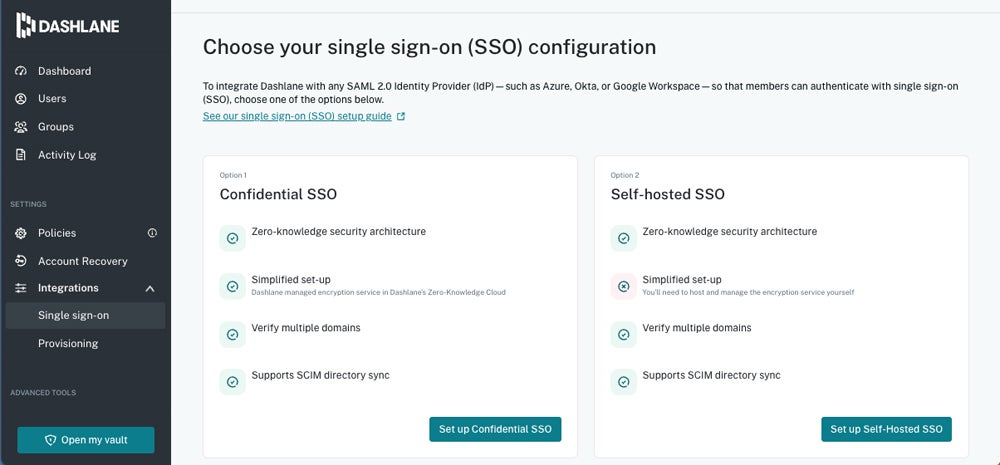
LastPass Teams offers 25 customizable security policies, an offline mode through its mobile and desktop apps, and shared folders. Upgrading to LastPass Business increases this to over 100 custom policies and adds API access, advanced reports, and SSO for up to three applications. Unlimited SSO support costs an extra $2 per user per month, while bundling it with MFA for contextual authentication and Windows/Mac workstation MFA adds $10 per user per month.
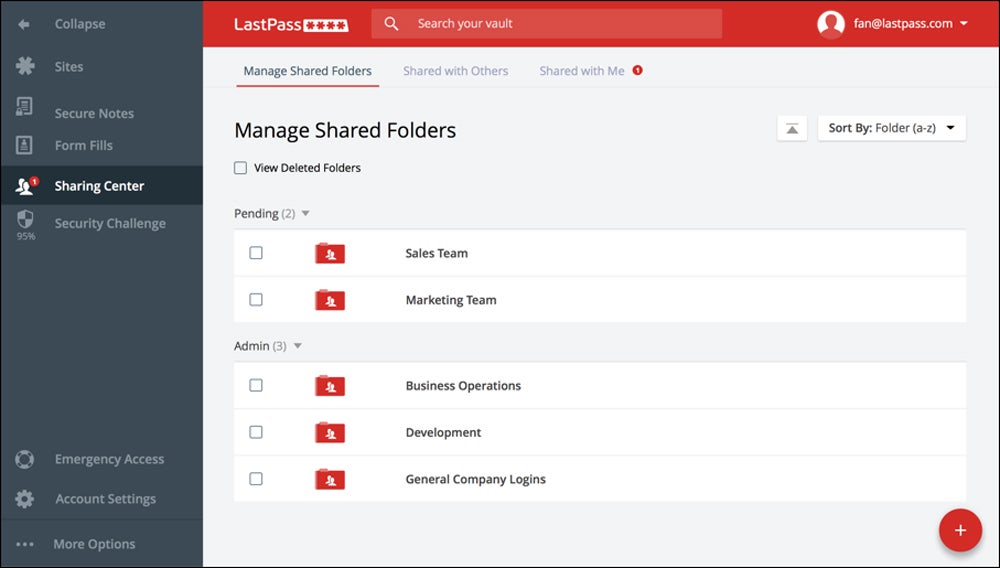
Better for Advanced Features: Dashlane
| Command Line Interface | Yes | Yes |
| Passkey Support | Unlimited | No |
| Dark Web Monitoring | Real-time monitoring for compromised email addresses and other personal info | Real-time monitoring for compromised email addresses |
| Custom Session Length | No; auto log-out after 15, 30, or 60 minutes | Yes |
| Visit Dashlane | Visit LastPass |
Winner: Dashlane gets the victory here for its passkey support and a broader focus on monitoring the dark web for personal information.
Dashlane supports unlimited passkeys on its browser extension and mobile apps. All Dashlane users receive real-time dark web monitoring for up to five email addresses. It scans the dark web for personal information related to your email such as usernames, Social Security numbers, and credit cards. When your information is detected in a breach, Dashlane immediately sends a notification and offers smart suggestions for changing your details.
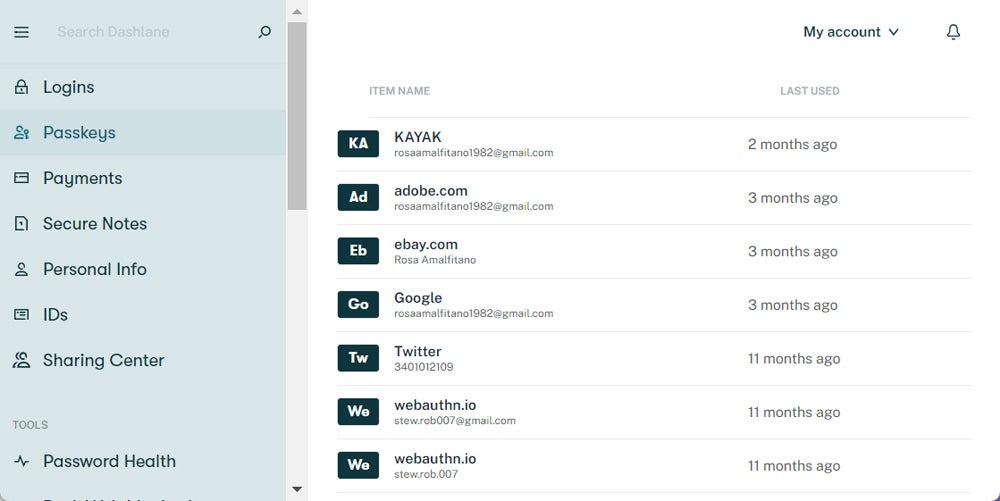
LastPass does not support passkeys, but it does give admins more flexibility than Dashlane in customizing session lengths beyond fixed time amounts. It also offers real-time dark web monitoring for up to 200 email addresses and allows businesses to configure policy settings within an organization. LastPass monitors a hashed version of an email address and checks against breaches up to one year prior to signing up for the service.
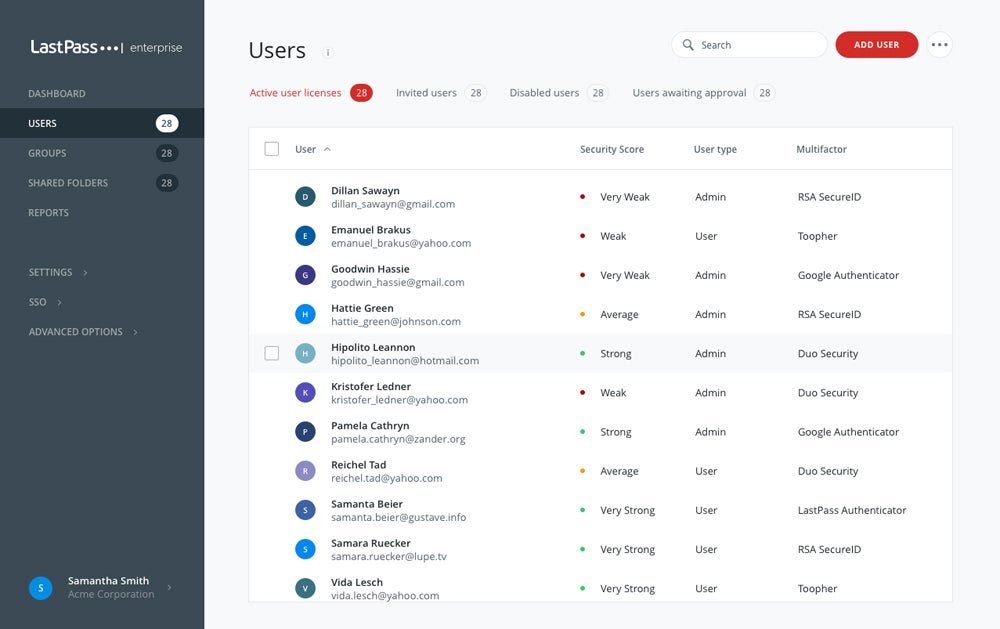
Better for Security: Dashlane
| Breach History | Clean | Multiple breaches, most recently in 2022 |
| Zero-Trust Architecture | Yes | Yes |
| Account Recovery | Recovery key, biometrics | Recovery key, biometrics, SMS, hints |
| Third-Party Vendor Audits | Confirmed | Confirmed |
| Password Dashboard | Yes | Yes |
| Visit Dashlane | Visit LastPass |
Winner: Dashlane’s clean breach history is likely the deciding factor for businesses that handle a lot of sensitive info and organizations that are strict about data security.
Dashlane has a zero-trust architecture with bank-grade encryption and has never been the victim of a security breach. Users can access the password health dashboard, which analyzes logins and highlights which ones are weak, reused, or compromised. If your business decides to leave the platform, Dashlane allows you to export your data and promises to purge it from their database. While Dashlane does undergo regular third-party audits, it doesn’t provide specifics.
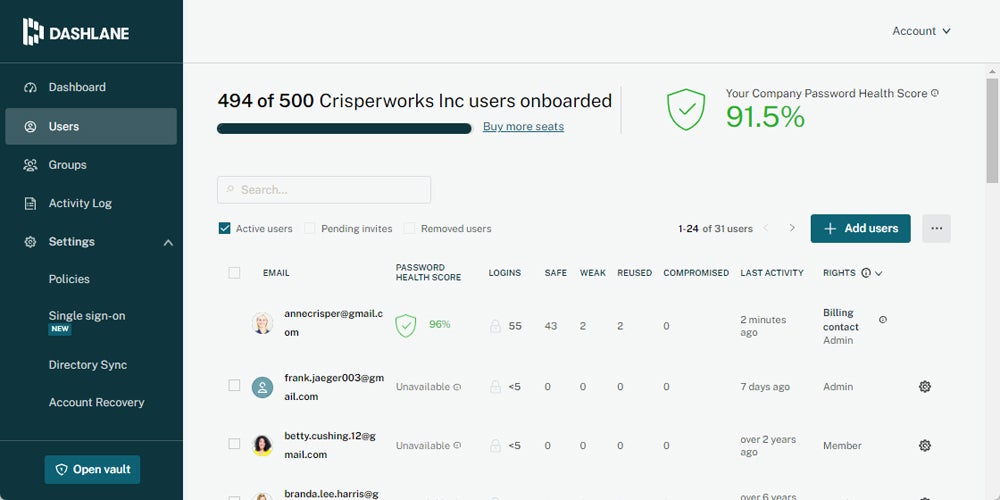
LastPass offers more account recovery options than Dashlane, including a recovery key, biometrics, SMS, and master password hints. It secures your data using a zero-knowledge model and AES 256-bit encryption and features a password dashboard. However, despite these measures, LastPass has experienced multiple breaches between 2015 and 2022, which may concern companies handling large volumes of highly sensitive data.
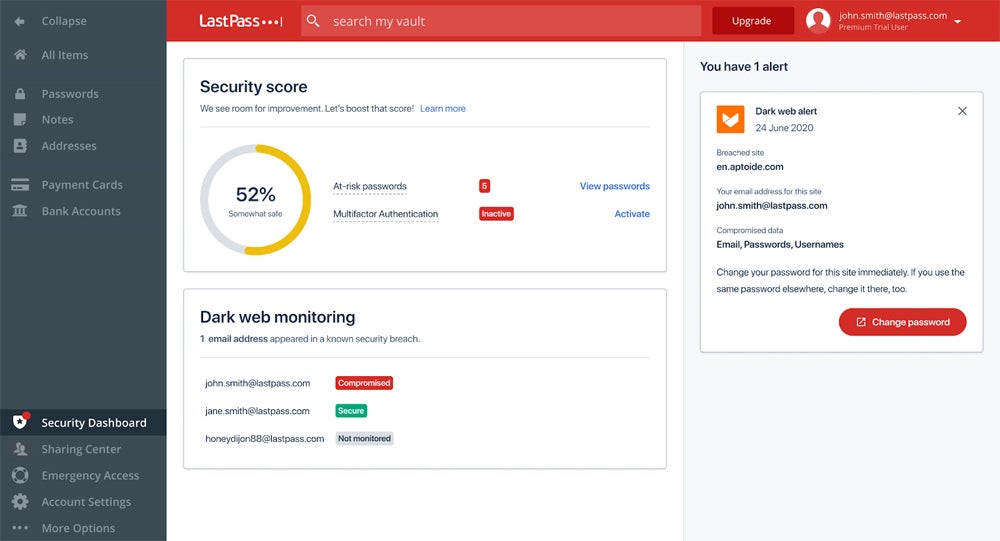
Better for Usability & Administration: LastPass
| Developer Community | Yes, on Reddit | Yes, self-hosted forums |
| Documentation | Plenty | Plenty |
| Custom Activity Reports | Yes, with integration | Yes, with Business |
| Onboarding Sessions | Yes (Enterprise) | Yes (Business & Enterprise) |
| G2 Ease of Use Score | 87% | 86% |
| Visit Dashlane | Visit LastPass |
Winner: LastPass has a slightly better balance of ease-of-use and greater admin privileges.
Dashlane is regarded as an easy-to-use password manager, making it a good choice for organizations new to this type of software. Seek advice from the Dashlane community on Reddit or browse an extensive library of how-to videos and step-by-step guides. Onboarding assistance is limited to Dashlane Enterprise. Despite some minor glitches with the autofill, Dashlane offers a seamless UX across its mobile platform and browser client.
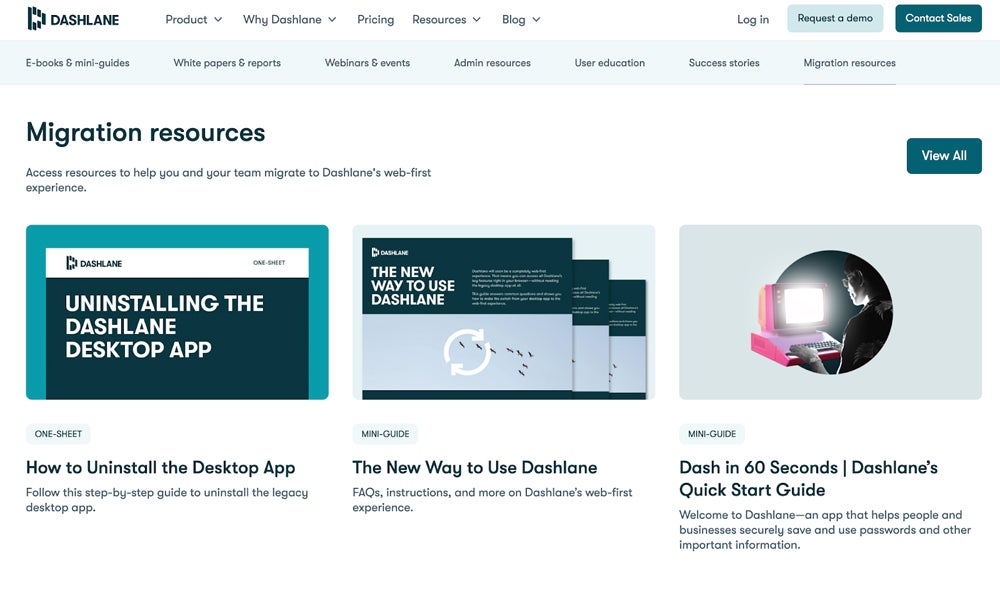
LastPass is another user-friendly platform with a near-flawless UX across devices, but its more flexible policy management options and broader reporting capabilities could be appealing to companies with complex needs. (On the other hand, this might make deployment slightly more complicated versus Dashlane.) Onboarding is included for business and enterprise plans; additional help is available through user forums and an extensive self-service knowledge base.
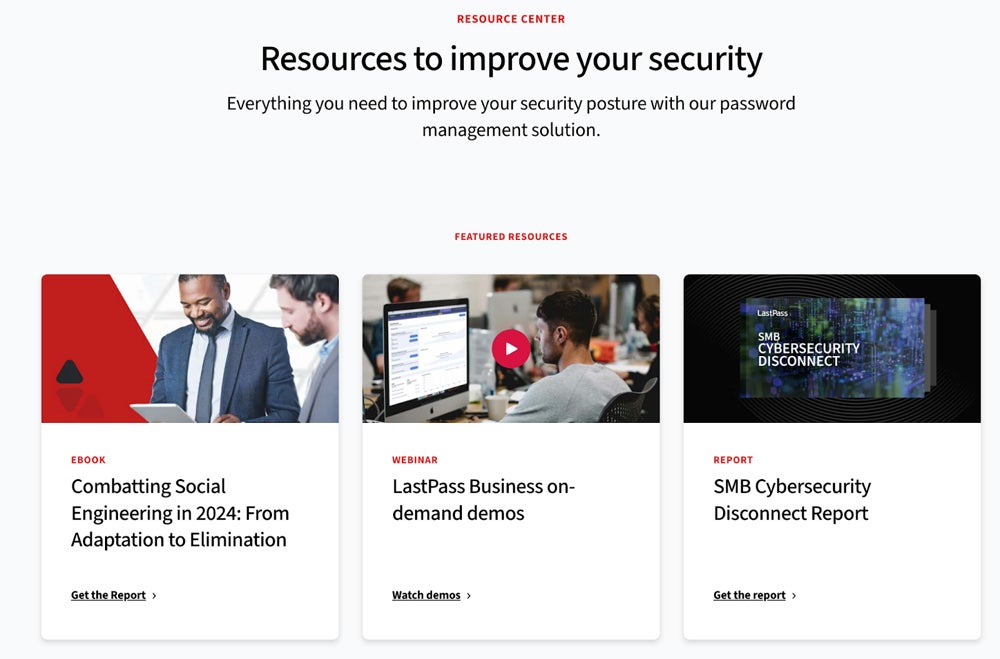
Better for Customer Support: LastPass
| Support Channels | Chat, email, phone, Reddit | Email, phone, forums |
| Live Support Hours | 9 am to 6 pm ET Monday-Friday;Email 7 days a week | 24/7 |
| Live Demo | Yes | Yes |
| Dedicated Customer Service Representative | Yes, with Enterprise | Yes, with Business & Enterprise |
| Visit Dashlane | Visit LastPass |
Winner: All-hours phone support gives LastPass the advantage here, although Dashlane’s quality of support is rated a bit more favorably.
All Dashlane Business users can speak to a live agent via chat, call a representative, or submit an email ticket. Live support hours are from 9 am to 6 pm ET on weekdays, but you can use the chatbot or visit Reddit anytime for less urgent matters. Dashlane Enterprise includes access to a dedicated customer service representative in addition to onboarding assistance. Overall, Dashlane support has a decent reputation, although some users wish it was more timely.
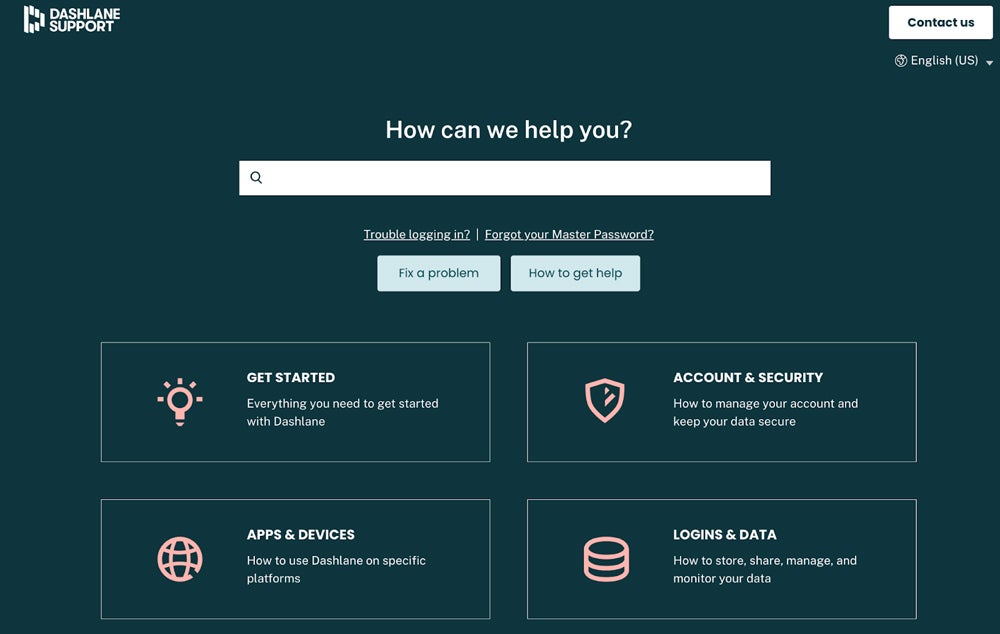
LastPass offers 24/7 on-demand phone support, ensuring you can reach a live person at any time. Other support channels include email tickets and the LastPass forums. LastPass Business users have access to a dedicated customer service manager during onboarding, a service not available with LastPass Teams. Despite live help at all hours, the quality of support is rated slightly lower than Dashlane’s, with several users wishing for a live chat option for quick queries.
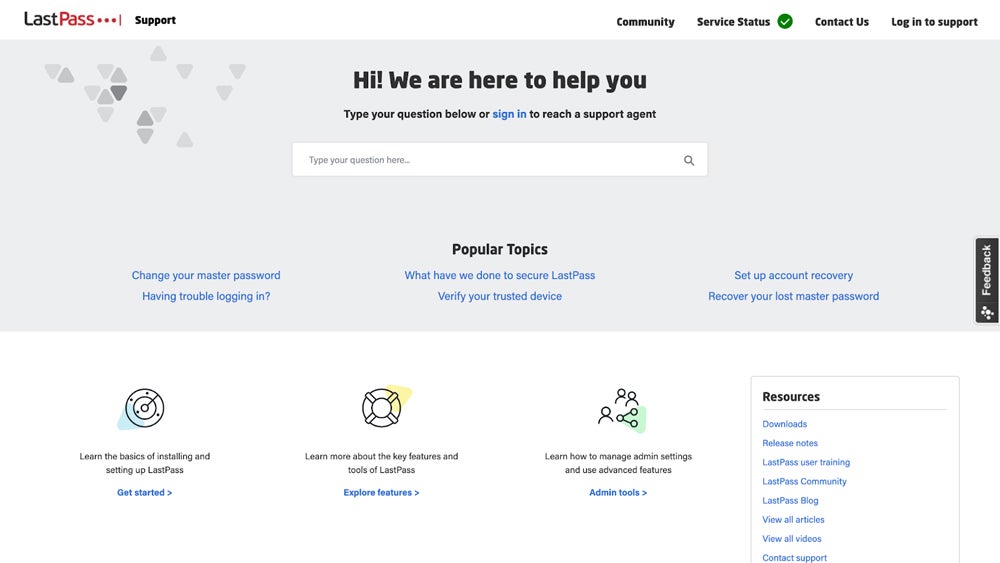
Who Shouldn’t Use Dashlane & LastPass?
Dashlane and LastPass have their merits, but neither option might answer your organization’s most essential network security needs.
Who Shouldn’t Use Dashlane
If you identify with the following scenarios, consider a Dashlane alternative:
- Small teams looking for a solid free or team-based plan: Dashlane eliminated its team plan and only offers one business plan at $8 per user per month. Dashlane Free is incredibly barebones.
- Admins seeking greater customization options: Other password managers provide more options for policy management and user permissions, though Dashlane’s CLI helps offer some leeway.
- Users who want a local desktop app: The lack of a desktop app may deter those who prefer not to rely on an internet connection for access. (Offline access is available through Dashlane’s iOS and Android apps.)
Who Shouldn’t Use LastPass
Look for an alternative to LastPass if any of these scenarios relates to you:
- Enterprises with heavy volumes of sensitive data: It’s understandable if such companies would feel more at ease going with a password manager that hasn’t had as many breaches as LastPass over the course of a decade.
- Companies that rely on passkeys: LastPass doesn’t offer support for passkeys, which is a glaring omission given how many of its competitors do this.
- Organizations seeking specific advanced features: Its core feature set is sound, but unlimited SSO and MFA support cost extra, while travel mode and guest access aren’t available at all.
3 Best Alternatives to Dashlane & LastPass
Many organizations consider Dashlane and LastPass to be the best password managers for their needs, but what if neither is the right fit for your team? 1Password, Keeper, and Bitwarden are the top alternatives to check out for more advanced features or lower monthly rates.
| Monthly Pricing (Billed Annually) | • Teams: $19.95 for up to 10 users • Business: $7.99/user | • Business Starter: $2/user (up to 10 users) • Business: $3.75/user | • Teams: $4/user • Enterprise: $6/user |
| Enterprise Plan | Yes, quote only | Yes, quote only | Yes, $6/user/month; quote for large-scale enterprises |
| Free Trial | 14 days | 14 days | 7 days |
| Key Features | Guest account, travel mode, custom reports and groups, up to 5GB of storage per user | Passwordless login, SCIM provisioning, policy engine and enforcements | Open-source code, public APIs, IAM integration, security key support |
| Visit 1Password | Visit Keeper | Visit Bitwarden |
1Password
1Password is a top-rated password manager that has a robust set of core features plus desirable extras such as guest accounts, travel mode, custom reporting, and secrets management via CLI. It’s never been breached and has a strong developer community. While it’s easy to use overall, some users warn of an obvious learning curve.
Choose the Teams plan ($19.95 per month for 10 users), a Business plan ($7.99 per user per month), or Enterprise plan (quote only). It comes with a 14-day risk-free trial. For a more secure option than LastPass and a more robust feature set than Dashlane, 1Password is your best bet.
Our Dashlane vs 1Password analysis puts these two password managers head-to-head, or read our 1Password review to learn all about what it has to offer.
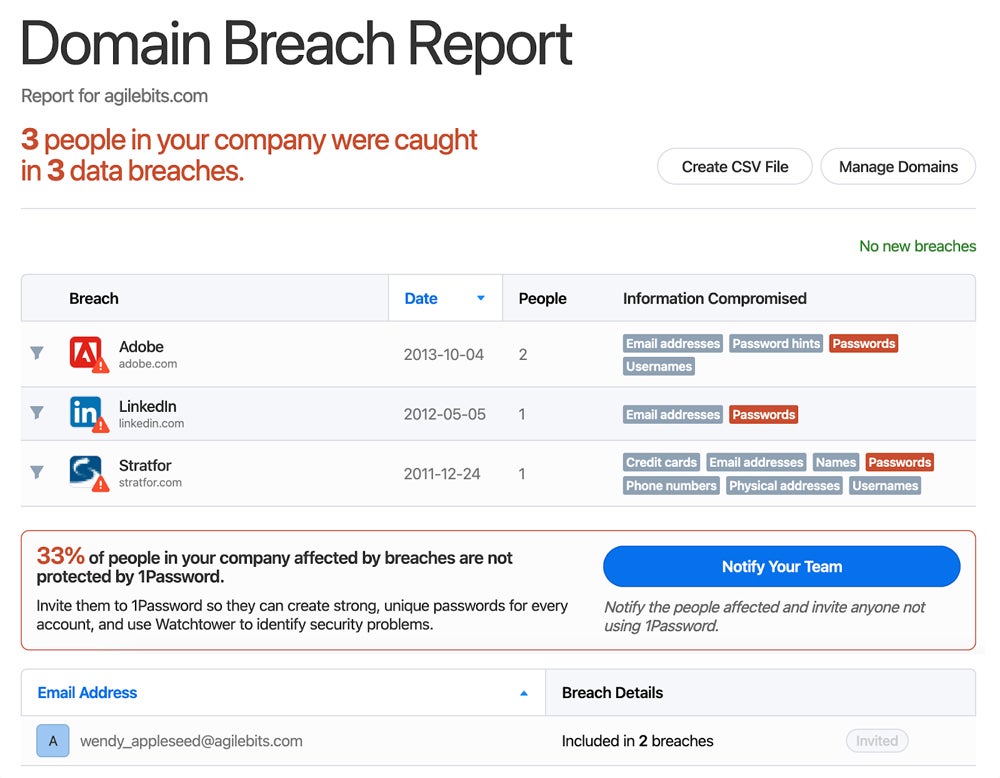
Keeper
Keeper suits small businesses, enterprises alike, and managed service providers. It’s user-friendly yet doesn’t skimp on functionality. Native features include dark web monitoring, activity reporting, and encrypted vaults with up to 5GB of storage per user. You can add an encrypted messaging app, secrets management, and dark web monitoring.
Keeper is among the least expensive PMs out there. The Teams plan is $2 per user per month for up to 10 seats, and the Business plan is $3.75 per user monthly. The add-ons could render the affordability point moot, but they also make Keeper more scalable than Dashlane or LastPass.
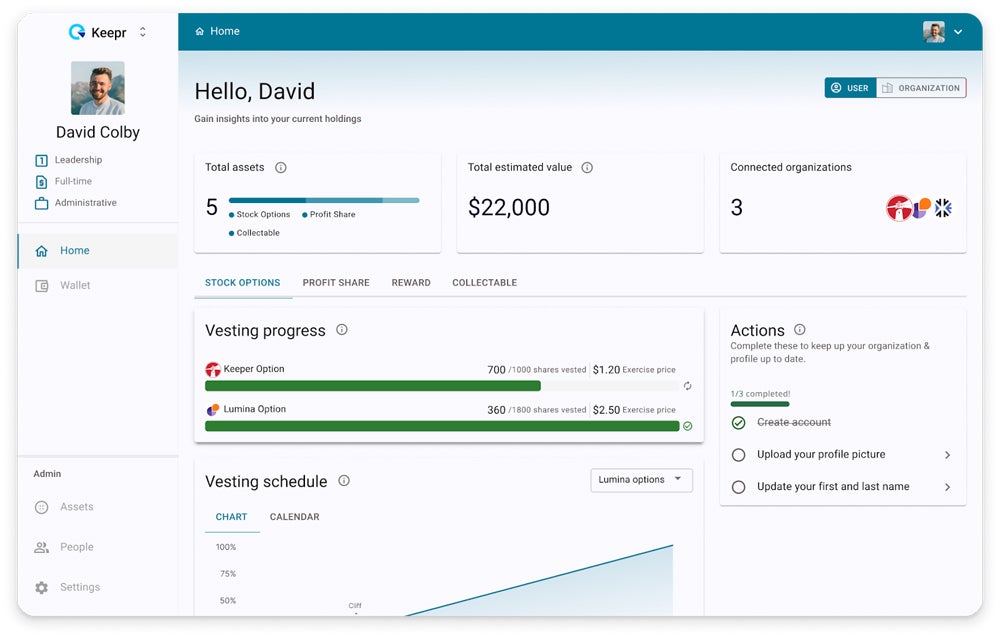
Take a look at our Keeper Password Manager review for an in-depth look at its core functionality, security features, pricing, and user support. You can also check out our Keeper vs LastPass comparison to see how they stack up against each other.
Bitwarden
Bitwarden is particularly suited to teams that are comfortable with using an open-source platform that has a level of malleability Dashlane and LastPass don’t have. Standard features include event and audit logs, user groups, and unlimited sharing. Upgraded plans add passwordless SSO, self-hosting capabilities, and SCIM support.
Monthly prices for Bitwarden range from $4/user with the Teams plan and $7/user for Enterprise, with custom plans for much larger organizations. That said, Bitwarden is well-suited to IT admins that like to be more hands-on with their password management solutions.
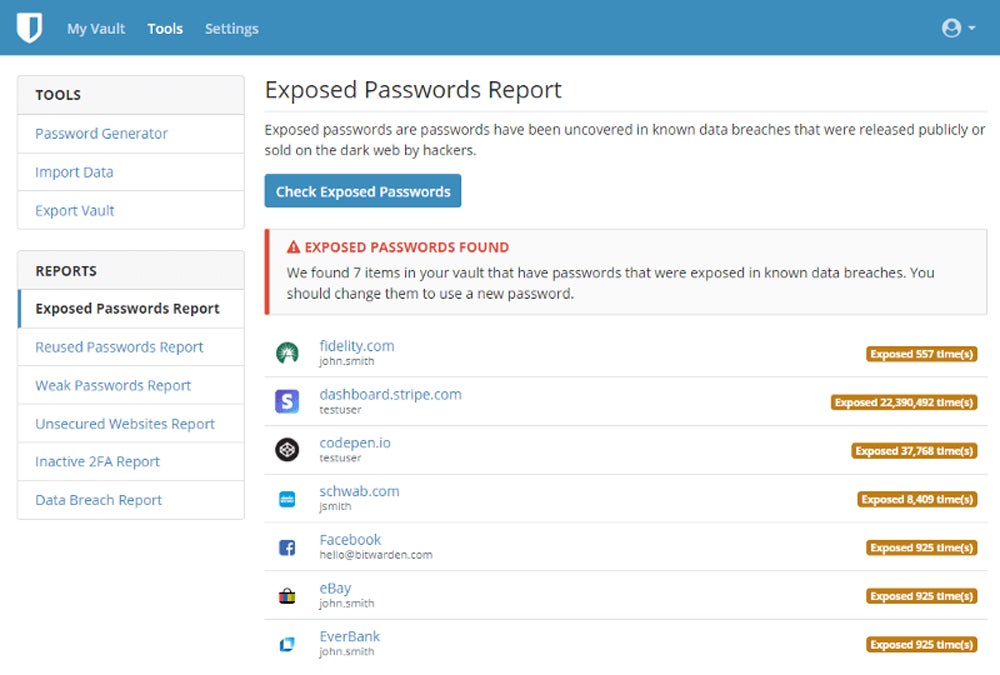
Learn why we consider Bitwarden to be among the best Dashlane and LastPass alternatives in our full Bitwarden review, which covers pricing, features, and more.
How I Compared Dashlane & LastPass
I assessed Dashlane and LastPass through a scoring rubric I created that details the six essential areas businesses should focus on most when selecting a password manager: core features, security, ease of use, advanced features, user support, and pricing. Each product received a final score (out of 5) based on a weighted system. There were also individual category winners, with LastPass outscoring Dashlane in four areas.
Core Features – 25%
This category holds the most weight since a password manager’s core features are key to its success. This encompasses must-have functions such as 2FA/MFA, activity monitoring, autofill, migration support, secure sharing, and policy management. I also compared each software’s level of compatibility across devices and operating systems to gauge its versatility.
Security – 20%
Companies rely on password managers to add another layer of protection for sensitive data. Here, I took a look at Dashlane and LastPass’s encryption standards, master password protection, third-party audit reports, and security architecture. I also considered breach history since this can greatly influence an organization’s level of trust in such a product.
Ease of Use & Implementation – 20%
A password manager should not only be secure but also accessible enough for employees to integrate into their daily workflow. Thus, I evaluated each platform’s knowledge base and vetted G2 reviews regarding ease of use. The other half of this category covers the admin side of things: ease of deployment, activity reports, security policy management, and user provisioning.
Advanced Features – 15%
Businesses with specific needs benefit from a password manager with advanced features for increased protection of their data. For this category, I considered perks like guest accounts, dark web monitoring, and passkeys — as well as a CLI and integration with GitHub and GitLab for administrators who want to customize and automate their systems.
Customer Support – 10%
In the event of an emergency, organizations want to know they can turn to a reliable support team for help. I evaluated the availability of Dashlane and LastPass’s live support channels, self-help portals, and real-time status reports. To gauge each platform’s quality of customer support, I vetted reviews from G2.
Pricing – 10%
I reviewed the pricing structures of each software for businesses of all sizes, from small teams to large enterprises. Additionally, I considered the availability of a free-for-life plan (possibly useful for solopreneurs), a trial period, and flexible billing options.
Bottom Line: Dashlane vs LastPass
In the showdown between Dashlane and LastPass, the better password manager will come down to your needs. Larger companies that handle sensitive data and rely on passkeys would prefer Dashlane for its emphasis on security and clean breach history. Small businesses seeking an accessible platform with all-hours support at a reasonable price may prefer LastPass. Ultimately, the best way to find out is to sign up for a free trial or request a demo.
Password managers are only one piece of the puzzle. Learn which other network security solutions to implement to protect your company from the most common network security threats.







